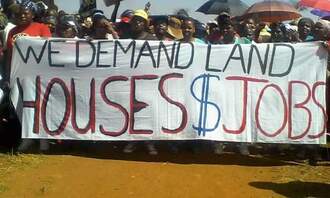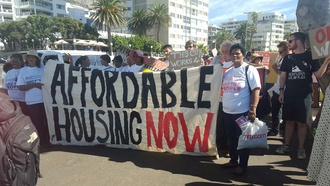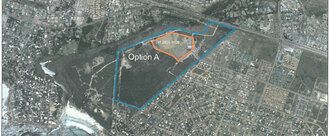- Featured
- Clean air
- Climate justice
- Consumer Rights
- Corporate Accountability
- Data access
- Early Childhood Development
- Economic fairness
- Education
- Electoral fairness
- Environmental justice
- Food justice
- Gender based violence
- Grants/social assistance
- Health
- Housing and infrastructure
- Industry interference
- Land Justice
- LGBTQIA+ rights
- Media/ information access
- Public transport
- Racism
- Reparations
- Safety
- Sanitation
- Service Delivery
- Sexual and Reproductive Rights
- Social justice
- Unemployment
- Womxn's rights/ gender equality
- Workers' rights
- More
-
Cheap rent for the rich? Object to the Rondebosch Golf Course leaseCape Town is the most spatially divided city in the country - it is still separated along race and class lines. The City has consistently blamed this spatial injustice on the lack of well-located land that could be used for affordable housing. But the City often misses the most obvious solution: It already owns massive pieces of land in well-located areas. Land that is unused or not being used to its full potential, that could provide ample space for affordable housing and reverse the City’s apartheid legacy. Last year, Ndifuna Ukwazi released a research report exposing how the City is disposing of the public land it owns by leasing it to private organisations at massively discounted rentals [3]. This land includes parking lots that are empty for up to 18 hours a day, bowling greens with very few members, and massive golf courses that provide enjoyment to only a few wealthy residents on the weekends. This is an inefficient, exclusive and unsustainable way to deal with well-located public land. Surely this land should be put to better use? If we are serious about addressing Cape Town’s apartheid legacy, we need to make our voices heard. Object to the lease renewal of 45,99 hectares of prime public land that should be used for affordable housing before 9 March 2020. The experts at Ndifuna Ukwazi have put together this progressive submission you can use when sending in your own objection. If enough of us send in our objections we can stop the City of Cape Town from renewing the Rondebosch Golf Club lease. [1] Cape Town’s course of injustice: Subsidising the rich to exclude the poor, Michael Clark for the Daily Maverick January 28 2020 [2] https://rondeboschgolfclub.com/membership [3] Ndifuna Ukwazi: Cape Town’s failure to redistribute land https://drive.google.com/file/d/1Pxly1G47qbC79l58Oss4vKvvK4AO71M-/view1,247 of 2,000 SignaturesCreated by Ndifuna Ukwazi

-
Save Msunduzi CityThe Msunduzi Local Municipality is dysfunctional and is on the brink of collapse and as residents and ratepayers of Msunduzi, hereby unanimously voice our strong and serious concern at the continued lack of effective and efficient delivery of basic services. We demand that the Msunduzi address and improve the service delivery issues and implement the auditor-general report recommendations of (2017-2018) by the 15 April 2019 failing which we, the long suffering residents and ratepayers of Msunduzi, will have no alternative but, in terms of Section 139 of our National Constitution, to motivate for National and Provincial intervention in the local government and management of Msunduzi, including that the Council be dissolved and the municipality placed under administration.5,663 of 6,000 SignaturesCreated by Anthony Waldhausen
-
Title deeds for the deserving residents of Pennyville flatsThe majority of people living in Pennyville are currently either unemployed or the families are child run or elderly run with most receiving grants. Most of them cannot afford the rentals and therefore in arrears amounting to thousands of rands. Attempts to address this matter with the relevant authorities have been unsuccessful.59 of 100 SignaturesCreated by Thabiso Seipobi
-
Stop all farm evictions1. Over 20 000 people are threatened by farm evictions in the Western Cape, Tshintsha Amakhaya is calling on president Cyril Ramaphosa to keep his promise following an announcement he made in Paarl in 2014 that there will be a moratorium as an immediate ban on legal and illegal farm evictions. Following the massive farm workers strike in De Doorns, Ramaphosa said, “We are calling on all farmers who have plans for evictions to stop the evictions.” However, the moratorium never came to effect. Instead, instances of farm evictions and human rights violations on farms persist. Today, Drakenstein Municipality has about 1,127 pending eviction matters. 2. The thousands of illegal evictions of farm workers and other farm dwellers continue to be evicted across the country despite the clear protections contained in the Extension of Security of Tenure Act 62 of 1997 (‘ESTA’) that a farm worker and persons living in the same dwelling as the worker may only be evicted: a) in terms of an order of the court b) once the court is satisfied that the eviction would be just and equitable c) and once the Land Claims Court has confirmed the order; 3. The great hardship, conflict and social instability caused by such evictions on a group of people already rendered vulnerable through their insecure tenure. 4. The disproportionate impact of these illegal evictions on women due to the commercial agricultural system that continues to confine women to an auxiliary labour category increasing their vulnerability to labour-related evictions. 5.The total system failure to protect the rights and security of farm workers and dwellers due to poor enforcement and resource endowment of ESTA; 6. The continued failure of municipalities to provide adequate alternative shelter as legislatively prescribed. 7. The Constitutional imperative, in section 25(6), to ensure that person whose tenure of land is legally insecure as a result of past racially discriminatory laws or practices, like farm workers and other farm dwellers, are provided with either legally secure tenure or comparable redress. Both farm workers and dwellers should be prioritised and be at the forefront of cases on which expropriation without compensation will be tested. “We used to work hard on this farm until we were retrenched in 1999. Nothing happened on the farm for 11 years and most of us couldn’t find work again. Now this farmer wants to evict us” This a desperate cry by a mother whose family is facing eviction from the farm she's worked and lived in for years [1]. She, like many others, now face a bleak future of being dumped on the road side with no protection and nowhere to go. President Cyril Ramaphosa made a promise in 2014 to stop farm evictions until people can be given dignified housing [2]. Even more recently, Deputy Minister Mcebisi Sikwatsha has seen with his own eyes the desperate situation farm workers are faced with [3] and also made promises to take it up with his Minister and President. We however cannot leave it to them. Thousands of illegal evictions of farm workers and other farm dwellers continue to be evicted across the country despite the clear protections contained in the Extension of Security of Tenure Act (ESTA). Places like Drakenstein are eviction hotspots with 1,127 pending evictions matters [4]. Evictions bring great hardship, conflict and social instability. The failure to protect the rights and security of farm workers and dwellers due to poor enforcement of ESTA and the failure of municipalities to provide adequate alternative shelter as legislatively prescribed need to be addressed. We need to stand with those being evicted and demand that government responds to the cries of the people. Will you tell President Cyril Ramaphosa and Minister Maite Nkoana-Mashabane to stop all farm evictions and help protect the rights and security of farm workers and dwellers? [1] [3] Western Cape could be testing ground for land expropriation without compensation, says minister, Barbara Maregele for Groundup News. 5 June 2018. [2] Ramaphosa asked to keep his promise to freeze farm evictions, Barbara Maregele for Groundup News. 5 April 2018. [4] Woman faces eviction after 51 years on a farm, Barbara Maregele for Groundup News. 31 May 2018.426 of 500 SignaturesCreated by Tshintsha Amakhaya

-
Tell the City of Cape Town that we reject the budget and privatization of waterCape Town is being used as an international social experiment. Yes there is a drought but 'day zero' is a deliberate lie to justify the rapid privatization of water. The City used a formula that assumed it would not rain; it assumed that it would be windy and hot every day; they failed to consider that large agriculture was abusing water; day zero was flawed from the beginning. Now the international banks are using Cape Town to threaten other cities in SA and the rest of the world, to privatize water. That is why we need to join hands to stop the privatization of water in Cape Town * over 260 000 families (almost half of Cape Town) has already had water management devices forced onto us. * these limit the amount of water that households can use per day * the city aims to change to pre-paid water; in other words, no money, no water; they have already introduced this in parts of Grabouw *currently the real cost of water provision is R6 per kl; the City has increased this by 500% and want to increase it by a further 27-87 %. They want to charge high tariffs for water so the large banks can make pots of money. *the City wants to borrow from international banks for large scale projects such as desalination; the major part of the water budget will go to desalination, about R7.4 bn. In other words, the international banks will make profits out of water. Desalination puts our water into private hands, for profits; desalinated water has caused the death rate from heart attacks to double; it also makes fruit less nutritious. * just as the national govt increased electricity prices by 20% per year, the City wants to do the same with water. * many of the water management devices (over 16%) are defective; they are leaking and shut off, leaving thousands without water for basic needs; * many are getting huge bills of thousands and sometimes hundreds of thousands of Rands. *pressure is reduced in the pipes during the times that people need water; thousands are without water. *the City and other levels of govt knew more than 10 years ago they had to adopt water saving measures such as using recycled water for sanitation; they knew they had to recycle water for recharging aquifers; they knew they had to fix the infrastructure (the City loses 100 million litres per day through leaks). They failed. If we do not stop the privatization of water, the same high tariffs and poisonous desalination will be forced on more communities in SA and around the globe. The next generations will be paying huge tariffs for water. If you have no money, you will have no water. People will die as a result. The City must be stopped. The Water Crisis Coalition is marching to the City and to parliament on the 25th April 2018 at 10am from Keizergracht , at the end of Darling Street, opposite the castle. We want to hand over all signatures and petitions. We invite you to print copies of our petition and to bring them along on the day. Copies can be obtained via [email protected] Some useful references: Proof that Day zero formula was fake: https://drive.google.com/file/d/0B2Fo95AHFCN2bGdGWU1uajRHcDMxVFZUdFFObFU4djhuWFg0/view?usp=sharing Here is the downloadable leaflet which can be used as a free train ticket on the 25th April 2018, for the march. https://drive.google.com/file/d/0B2Fo95AHFCN2aThmWFRrdHZvYUhCNXp0ejFvX3piNHU3eVRZ/view?usp=sharing Joint Saftu-Water Crisis Coalition memorandum handed to the City on our demands on water 12 April 2018 https://drive.google.com/file/d/1xLVvvmRPzUZKJWFBxwGphhGFItJF6W0-/view?usp=sharing Downloadable petition which we will hand over to the Mayor on the 25th April 2018. Why not sign up your community or workplace? https://drive.google.com/file/d/0B2Fo95AHFCN2VVQ0OWYtSGNIWkNDeXVBWk9lcDk5ZFU5MVU4/view?usp=sharing Thesis on some of the 70 springs around Table Mountain https://etd.uwc.ac.za/bitstream/handle/11394/2686/Wu_MPHIL_2009.pdf?sequence=1&isAllowed=y Now the City wants to reduce the collection points for water at Newlands from 32 to 16. Let us march against this madness. Open the springs now. https://m.facebook.com/groups/320668791777159?view=permalink&id=355469214963783 Call by Reclaim Camissa on the need to preserve our springs http://thegreentimes.co.za/calling-government-conserve-groundwater-springs/ Reclaim Camissa site www.reclaimcamissa.org www.facebook.com/RECLAIMCAMISSA/ http://twitter.com/ReclaimCamissa There are a number of other petitions against the budget. We are not in competition with any of them but wish to bring our perspective forward. If you are not comfortable with signing our petition, here is a site which you can consider: https://www.dearcapetown.co.za/coct-budget/3,441 of 4,000 SignaturesCreated by Water Crisis Coalition
-
Tell DUT to pay workers decent living wages and end the strikeDUT staff moral is at its lowest because of the failure by management and the council to resolve this matter in a timely and respectful manner. Staff also deserve a decent salary for their living, it is a violation of their rights when they are ignored by the Vice Chancellor, management and the Council as well. This frustrates staff, and as a result they are withholding their labour and the whole university is badly affected. We want our kids to study and we want staff that will attend to our student needs in a manner that truly affirms that DUT is a student centred university of which right now is not the case. The strike is affecting students in so many ways. One of the students, Sphamandla Gumede, when interviewed by Independent News said, "it makes me very angry. At home they don’t understand why we haven’t started studying. They are thinking I am coming to university to just waste money." https://www.iol.co.za/dailynews/dut-strike-leaves-students-despondent-133006711,933 of 2,000 SignaturesCreated by Nomvula Maneli
-
Stop the demolition of homes in Newcastle**UPDATE: The Pietermaritzburg High Court ruled today that the families may not be moved to unstable structures. The Hadebe home in Newcastle, Kwa Zulu Natal will be demolished by Ikhwezi Mining on Friday 15 December 2017. The mine is after the coal in the ground. The Hadebe's and 11 other families were represented by the Department of Land and Rural Affairs who have recently pulled out of the case. The Habede family and its community will be headed to the Pietermaritzburg High Court today, 13 Decemeber 2017, without legal representation. The case will be heard and if the mine wins, these families will spend Christmas in unstable iron structures. https://www.facebook.com/groundWorkSA/posts/2236639909695404103 of 200 SignaturesCreated by Amandla.mobi Member
-
Stop the Somerset Precinct RezoningThe Western Cape Provincial Government has submitted an application to have the land rezoned from Community Open Space and Open Space to General Business 6. This would allow for general business activity, such as restaurants, shops and office spaces in tall buildings. In terms of spatial planning and land use law (any building or development must take place in-line with these laws), the City of Cape Town, is the authority that must either: • Accept the application • Reject the application • Accept the application with conditions attached. Furthermore, there are a number of things that are wrong with the proposed development, namely: 1. Little public benefit The proposed development prioritises the economic value of the land over its social value. As a result, the proposed plan paves the way for the site to be privatised with very little public benefit. The Provincial government is treating this prime piece of public land just like a for-profit private developer would. 2. A step backwards The regional hospital is moving from the site and will be replaced by a small community day clinic (2500m² in size). This represents a significant step backwards in terms of the public benefit that Provincial government’s most expensive piece of land will provide. 3. The plan is vague The plan does not give enough detail, which means that the City will not be able to understand the full impact that the development would have. 4. Too little affordable housing The plan says that it will include ‘at least 300 affordable housing apartments’. Research by local and international experts found that the Tafelberg site in Sea Point could fit 316 affordable apartments together with 120 market-rate apartments. The Tafelberg site is six times smaller than the Somerset Hospital Precinct, which shows that the development proposal is not serious about providing a decent amount of affordable housing The other big problem is that affordable housing is not defined. Who will it be affordable for? At the end of the day much more housing can go onto the site – this is not realising the full potential of the site for poor and working class people. 5. Broken promises Helen Zille and her Cabinet ‘promised’ that the land would be released on the specific basis that as much affordable housing as possible must be included. 6. Business as usual Since the beginning of democracy there hasn’t been a single subsidised housing unit created in Cape Town’s inner city and surrounds. Cape Town’s spatial apartheid remains unchanged. The Somerset Hospital is perhaps the most important piece of publicly owned land for addressing spatial apartheid in Cape Town’s inner city, and this decision will have enormous impacts on South Africans for generations to come. This development proposal shows that Helen Zille’s government remains uncommitted to achieving spatial justice in Cape Town and that it has been captured by a style of exclusive property development for the rich. The main idea of the development is to generate funds from the site to pay for social amenities ‘elsewhere’. This approach to the development of well-located public land ensures that ownership, occupation and use of central city land remains only in the hands of the rich. This corrupted approach entrenches spatial apartheid and contradicts provincial Government’s own policies. 7. Zille’s Rogue Department of Transport of Public Works The applicant is the Western Cape Government’s Department of Transport & Public Works, through the Regeneration Programme – a programme aimed at developing strategic pieces of Provincially owned land. Despite spending millions of Rands on consultants and repeated studies, the programme has still not broken ground on a single site since it was established 7 years ago. This is the same government department that has to date never handed over any Provincially owned land to the Department of Human Settlements. This is the same programme that attempted to unlawfully sell the Tafelberg property in Sea Point, even though the Department of Human Settlements requested the site to develop affordable housing. Tafelberg was sold to help pay for a R1,2 billion office block for Provincial government. This is the same programme where Gary Fisher was both a senior public official responsible for land disposal and a private property investor and developer. Despite these serious conflicts of interest, there has still been no investigation. 8. De Lille rolls out red carpet for spatially violent developments By law, the City of Cape Town must consider the principle of spatial justice. The City can place conditions that have to do with to the social impact of any development – whether on public or private land. The Mayor, Patricia de Lille can require any development to include some affordable housing. However, she has never used this power before because she believes land is for profit not for people!346 of 400 SignaturesCreated by Amandla.mobi Member
-
Protect Customary Land RightsThe Constitution recognises the informal or customary rights of people living in the former homelands yet the Department of Rural Development and Land Reform has failed to legislate a communal land rights law that will strengthen and protect these rights. As a result; * Big cooperates are grabbing land in the communal land without any compensation for loss citing development. * Nature of individuals and family rights within a broader community are not clarified, and overshadowed by majority in the community. * People are not adequately compensated when land is sold or awarded for big developments * Consultation and Consent of land occupiers is not respected because of the weak nature of the rights provided by current law. In 1996, Parliament passed the Interim Protection of Informal Land Rights Act (IPILRA) to provide protection for all people living on communal land in the former Bantustans, people living on trust land, people who previously had Permissions to Occupy (PTOs) and anyone living on land uninterrupted since 1997 “as if they were the owner”. This was a big milestone in the protection and recognition of customary land rights and the empowerment of families to be part of bargaining and negotiations of any socio-economic development happening in their land. Although people are protected by IPILRA, the fact that it is temporary and can be renewed annually, deprives people of their rights to say NO to development that disadvantages them. This makes it easy for "developers" or Government to easily expropriate the land. It is also worth noting that the law also states that the Minister of Rural Development and Land Reform can make regulations in terms of IPILRA to provide more detailed processes and procedures.83 of 100 SignaturesCreated by Alliance for Rural Democracy
-
Prioritize housing and land needsAs residents from Freedom Park, south of Johannesburg, we marched on 20 March 2017 to the ANC headquarters, in a bid to demand the rights to occupy vacant land on the outskirts of the area in which we live. With the ANC set to hold a policy conference in June to discuss, among other issues, how to expropriate land for the benefit of communities as tabled in its Strategy and Tactics Discussion Document, we call on you to stand in solidarity with all landless people across South Africa by supporting this campaign. “We have been living in Freedom Park as tenants for almost all our lives. None of us here owns any land. All we are asking for is for government to give us some piece of land, and we will build our own shacks.” “We are members of the ANC, and we trust it to listen to our cries. All we want is land.” We have adopted this Eleven Points Program for Freedom Park Backyard Dwellers to advance the fight for decent and habitable housing for all. 1. Occupy land and erect structures for as long as there is a backlog of decent Housing for all. 2. Resist evictions and fight not to be evicted or be moved to other places where we do not wish to live. 3. Fight for closing down of all municipal anti-land invasion units and all private eviction squads, such as the Red Ants, that municipalities outsource this function to. 4. The struggle of the Marikana occupiers in Philippi (Cape Town) is a victory for the landless people of Azania and it must be defended. The Marikana occupation and struggle in Philippi has resulted in a Constitutional Court decision that it is unlawful for anti-land 'invasion' units to knock down a structure or structures that have been built by occupiers as a home to live in, regardless of how long the structure has stood or whether there is furniture in it. 5. Occupations are a legitimate means for us to survive poverty and unemployment and speed up the process of land redistribution that the government promised but continues to fail to deliver. 6. We note that even under the so-called democratic dispensation the state continues to uphold the property rights of the rich, while the poor are expected to rot away under intolerable living conditions. 7. We reject the state's zero tolerance policy on occupations that is enforced by municipalities, the police and the courts. It is a contradiction to talk about “land reform” – as the government has again been doing recently – while at the same time denying people’s right to occupy land and punishing them if they do. 8. We note that over many decades of forced removals and pass laws the Black masses in occupied Azania, in defiance of apartheid, won the right to occupy land and build structures/shacks. This must be defended and extended in order to ensure adequate and just land redistribution for the landless Black masses dispossessed of their land through colonialism and apartheid. 9. Today, those who occupied land prior to 1994 are not threatened with eviction; while those who occupy today face the state’s harsh and repressive zero tolerance policy on occupations. We reiterate that it is a contradiction for the state to talk about land reform and yet deny people the right to occupy the land of their ancestors and birth. 10. This makes a mockery of the new democracy and effectively criminalizes our struggle for decent and habitable Housing. 11. By failing to address the housing crisis, by allowing the appalling conditions that people face daily and by failing to provide decent and habitable housing for all the state and it's functionaries are the real ‘criminals’. Those who occupy land and struggle to improve their living conditions are guilty of nothing other than pursuing the rights the Constitution and government have promised them.47 of 100 SignaturesCreated by Amandla.mobi Member
-
Prioritize social housingToday we announce that we have embarked on a symbolic occupation of the Helen Bowden Nurses Home and the Woodstock Hospital to demand Urban Land Justice in Cape Town. We are Cape Town residents from across the race and class divide. We are residents of Woodstock, Sea Point, Marikana informal settlement, Blikkiesdorp and Khayelitsha. We are from communities at the forefront of the housing and segregation crisis in our city. We stand in solidarity with the struggles of all poor and working class people who still live homeless under bridges; in shacks and informal settlements at the edge of our city; in backyards and wendy houses on the Cape Flats; and in store rooms and domestic quarters in former white suburbs. The colonial and apartheid governments divided our city, controlled where we could live and forcefully removed our families from their homes. Our parents and grandparents resisted and overcame racial oppression. They fought for the rights to dignity, justice, equality, and adequate housing that our Constitution now guarantees. But we still experience the violence of apartheid spatial planning and segregation. A dignified life with access to good services and decent work is reserved for a few. We still experience violent evictions from our homes by private property owners and our government. This, while private landlords, developers and banks are making obscene profits. Land must be for people, not for profit. We are angry that our City, our Province and our National governments have failed to acknowledge our struggles for land and for affordable housing. They have failed to bring Black and Coloured people back into our city. We believe that symbolic and peaceful civil disobedience is now justified in the defence of our Constitution and our Constitutional rights. As we have now made our home here for over 48 hours, the law is clear that we may not be evicted without an order of court. We call on the Province and the South African Police Service to act lawfully and refrain from using violence or other tactics of state oppression against us.37 of 100 SignaturesCreated by Amandla.mobi Member
-
Stop The Sandbaai Commonage SaleURGENT ATTENTION: HERMANUS MIDDLE CLASS AFFORDABLE HOUSING We have great concern that our needs are not being understood as they are not being recognized. We request your urgent attention to this as the IDP for the next 5 years is in the process of being developed. Our needs must be catered for. We are looking for you to support land identification and allocation for middle class housing that is affordable in Hermanus close to Zwelihle, transport and our places of work. This is NOT GAP Housing. It is a totally different model. Our Needs: We, the Hermanus Middle Class Housing Committee represent over 200 middle class professionals living in Zwelihle and working in Hermanus who simply need: 1. To live in a home that is not one room and is made from bricks and mortar (instead of often a zinc shack). 2. To have the option of 2, 3 and 4 bedroom homes with their own yard where our children can play safely out of the traffic. 3. To have the option to buy already developed units. 4. Different repayment models, besides outright purchase as a bonded house subsidy houses 5. To be part of an integrated development plan that is not built on an Apartheid model. We need to enter the “normal” property market. 6. To be fully consulted with regards and future proposals. Our needs are NOT GAP housing. We are NOT looking for FREE housing. We earn well and are willing to pay for something we can afford. We will apply for bonds. We want something much more than an RDP or GAP house. BUT we cannot afford the hugely inflated property and land prices in and around Hermanus. They say there is no land in Hermanus but land sale are out for tender.Hermanus has become probably the most unequal town of its size in South Africa. The wealthy have their spacious properties and the poor are stuck in townships bursting at the seams. Hermanus properties and rentals at a reasonable monthly payment for middle class people in any area are simply not available. Middle Class people are forced to live in squalor while they can afford more. The people included in this ‘middle class’ classification include there are many educators, health workers, Correctional services,municipal employees and other professionals, who will soon move out of Hermanus to find acceptable housing in other places, if they cannot get affordable accommodation. Already there is a problem at schools with teacher posts vacant as young people don’t want to live here. Obviously there are business owners who also have no viable options for creating homes for themselves.182 of 200 SignaturesCreated by Nomawethu Lamani
.png)




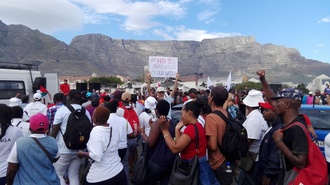
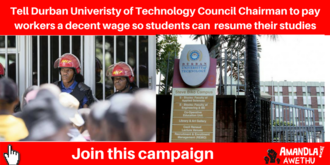
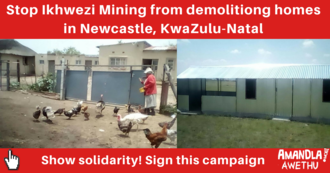
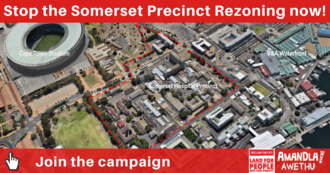.png)

